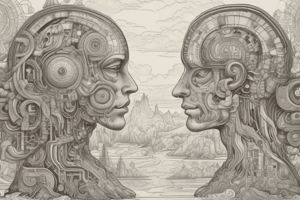Podcast
Questions and Answers
What is the primary function of short-term memory (STM)?
What is the primary function of short-term memory (STM)?
- Recalling facts and knowledge
- Acting as a temporary buffer for information processing (correct)
- Storing information permanently
- Encompassing skills and habits
How would you describe declarative memory?
How would you describe declarative memory?
- Inability to form new memories after a traumatic event
- Permanent storage of information that can be consciously recalled (correct)
- Memory that encompasses skills and habits
- Memory that lasts for only a few seconds
What characterizes anterograde amnesia?
What characterizes anterograde amnesia?
- The permanent storage of information that can last a lifetime
- The inability to form new memories after a traumatic event (correct)
- The inability to retrieve information before a traumatic event
- Acting as a temporary buffer for information processing
How do recall and cognition interact in memory processes?
How do recall and cognition interact in memory processes?
Which cognitive function involves using knowledge and reasoning to solve a problem?
Which cognitive function involves using knowledge and reasoning to solve a problem?
What type of memory is typically more resistant to retrieval difficulties than declarative memory?
What type of memory is typically more resistant to retrieval difficulties than declarative memory?
Which factor can significantly impact our ability to remember, learn, and think clearly?
Which factor can significantly impact our ability to remember, learn, and think clearly?
What is the process by which sensory input is interpreted and organized to create meaningful representations of the world?
What is the process by which sensory input is interpreted and organized to create meaningful representations of the world?
What can we develop by understanding memory and recall processes better?
What can we develop by understanding memory and recall processes better?
Which cognitive function involves selecting important information from the environment and filtering it for focus?
Which cognitive function involves selecting important information from the environment and filtering it for focus?
Which aspect of Thomas Hood's poetry is highlighted in the text?
Which aspect of Thomas Hood's poetry is highlighted in the text?
What type of emotions does 'I Remember I Remember' evoke in its readers?
What type of emotions does 'I Remember I Remember' evoke in its readers?
How did Thomas Hood's later works differ from his early humorous writing?
How did Thomas Hood's later works differ from his early humorous writing?
What impact did 'The Song of the Shirt' and 'The Bridge of Sighs' have on Thomas Hood's reputation?
What impact did 'The Song of the Shirt' and 'The Bridge of Sighs' have on Thomas Hood's reputation?
What is a key theme expressed in Thomas Hood's poem 'I Remember I Remember'?
What is a key theme expressed in Thomas Hood's poem 'I Remember I Remember'?
How does the structure of Thomas Hood's poem 'I Remember I Remember' reflect the theme of memory?
How does the structure of Thomas Hood's poem 'I Remember I Remember' reflect the theme of memory?
What role does humor play in Thomas Hood's poem 'I Remember I Remember'?
What role does humor play in Thomas Hood's poem 'I Remember I Remember'?
How are nostalgia and loss portrayed in Thomas Hood's poem 'I Remember I Remember'?
How are nostalgia and loss portrayed in Thomas Hood's poem 'I Remember I Remember'?
What effect do the repetitions in 'I Remember I Remember' have on the poem?
What effect do the repetitions in 'I Remember I Remember' have on the poem?
How does Thomas Hood's 'I Remember I Remember' contribute to his legacy as a poet?
How does Thomas Hood's 'I Remember I Remember' contribute to his legacy as a poet?
Flashcards are hidden until you start studying
Study Notes
I Remember I Remember: Exploring Memory, Recall, and Cognition
Remember that moment when you tried to recall a specific detail from your past, and it felt like searching for a needle in a vast mental haystack? That's where memory, recall, and cognition intertwine to paint the rich tapestry of our minds.
Memory: The Storage Room of the Mind
Memory can be thought of as our brain's personal hard drive, where experiences, emotions, and knowledge are stored. There are two primary types of memory:
- Short-term memory (STM): Lasts for a few seconds to a minute and acts as a temporary buffer for information that needs to be processed or transferred to long-term memory.
- Long-term memory (LTM): Permanent storage of information that can last a lifetime.
LTM is further divided into declarative and non-declarative memory. Declarative memory covers facts and knowledge that we can consciously recall, while non-declarative memory encompasses skills, habits, and procedural knowledge that we learn without being aware of the process (like riding a bike).
Recall: Bringing Memories to Light
Recall is the act of accessing information stored in memory. It can be further divided into two types:
- Retrograde amnesia: The inability to retrieve information that was learned before a traumatic event.
- Anterograde amnesia: The inability to form new memories after a traumatic event.
Our ability to recall information is influenced by factors such as the strength of the memory, the association of the memory with other information, and the type of memory. For example, non-declarative memory is typically more resistant to retrieval difficulties than declarative memory.
Cognition: The Process of Information Processing
Cognition is the mental processes that involve acquiring, interpreting, storing, retrieving, and using information to make decisions and solve problems. It comprises the following functions:
- Attention: The process by which information is selected from the environment and filtered to focus on what's important.
- Perception: The process by which sensory input is interpreted and organized to create meaningful representations of the world.
- Learning: The process by which new information is acquired through experience and practice.
- Problem-solving: The process by which we use knowledge and reasoning to solve a problem.
- Decision-making: The process by which we weigh the options and make a choice based on the available information and our preferences.
Cognitive functions are not independent but interconnected, and their efficiency is crucial for successful memory and recall.
Memory and Recall in Context
The importance of memory and recall in our lives cannot be overstated. They allow us to learn from our experiences, improve our decision-making abilities, and develop a sense of self and identity. On the other hand, cognitive decline is often associated with age or brain injury, and it can significantly impact our ability to remember, learn, and think clearly.
Memory and recall are not perfect, and there are various factors that can influence their quality and efficiency. These include genetics, lifestyle choices, stress, sleep, and mental health. However, by understanding these processes better, we can develop strategies to enhance our cognitive function, improve our memory, and strengthen our recall abilities.
So, the next time a memory slips your mind or you struggle to recall a detail, remember that there's more going on than you might initially think—and that's an exciting aspect of the human experience!
Studying That Suits You
Use AI to generate personalized quizzes and flashcards to suit your learning preferences.




